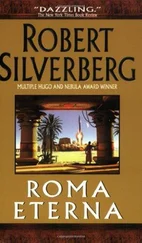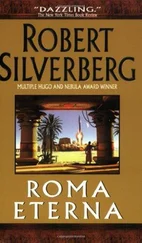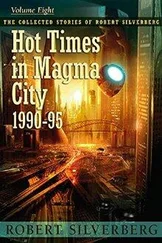Robert Silverberg - Breckenridge and the Continuum
Здесь есть возможность читать онлайн «Robert Silverberg - Breckenridge and the Continuum» весь текст электронной книги совершенно бесплатно (целиком полную версию без сокращений). В некоторых случаях можно слушать аудио, скачать через торрент в формате fb2 и присутствует краткое содержание. Год выпуска: 2009, ISBN: 2009, Издательство: Subterranean Press, Жанр: Фантастика и фэнтези, на английском языке. Описание произведения, (предисловие) а так же отзывы посетителей доступны на портале библиотеки ЛибКат.
- Название:Breckenridge and the Continuum
- Автор:
- Издательство:Subterranean Press
- Жанр:
- Год:2009
- ISBN:978-1-59606-212-2
- Рейтинг книги:3 / 5. Голосов: 1
-
Избранное:Добавить в избранное
- Отзывы:
-
Ваша оценка:
- 60
- 1
- 2
- 3
- 4
- 5
Breckenridge and the Continuum: краткое содержание, описание и аннотация
Предлагаем к чтению аннотацию, описание, краткое содержание или предисловие (зависит от того, что написал сам автор книги «Breckenridge and the Continuum»). Если вы не нашли необходимую информацию о книге — напишите в комментариях, мы постараемся отыскать её.
Breckenridge and the Continuum — читать онлайн бесплатно полную книгу (весь текст) целиком
Ниже представлен текст книги, разбитый по страницам. Система сохранения места последней прочитанной страницы, позволяет с удобством читать онлайн бесплатно книгу «Breckenridge and the Continuum», без необходимости каждый раз заново искать на чём Вы остановились. Поставьте закладку, и сможете в любой момент перейти на страницу, на которой закончили чтение.
Интервал:
Закладка:
“—or else they grow up and deliberately fashion themselves into the opposites of their parents, and somewhere along the way the parents die off, and the kids have kids, and the cycle starts around again. Around and around, generation after generation, Noel Breckenridge III, Noel Breckenridge IV, Noel Breckenridge XVI—”
Arios—Scarp—Militor—Horn—
The city—the gate—
“—making money, spending money, living high, building nothing real, just occupying space on the planet for a little while, and what for? What for? What does it all mean?”
The granite pillars—the aurora—SPACE AND TIME—
“You’re on a bummer today, Noel,” Munsey said.
“I know. Aren’t you sorry you asked what was bugging me?”
“Not particularly. Everybody goes through a phase like this.”
“When he’s seventeen, yes.”
“And later, too.”
“It’s more than a phase,” Breckenridge said. “It’s a sickness. If I had any guts, Harry, I’d drop out. Drop right out and try to work out some meanings in the privacy of my own head.”
“Why don’t you? You can afford it. Go on. Why not?”
“I don’t know,” said Breckenridge.
Such strange constellations. Such a terrible sky.
Such a cold wind blowing out of tomorrow.
“I think it may be time for another martini,” Munsey said.
They had been crossing the desert for a long time now—forty days and forty nights, Breckenridge liked to tell himself, but probably it had been more than that—and they moved at an unsparing pace, marching from dawn to sunset with as few rest periods as possible. The air was thin. His lungs felt leathery. Because he was the biggest man in the group, he carried the heaviest pack. That didn’t bother him.
What did bother him was how little he knew about his expedition, its purposes, its origin, even how he had come to be a part of it. But asking such questions seemed somehow naive and awkward, and he never did. He went along, doing his share—making camp, cleaning up in the mornings—and tried to keep his companions amused with his stories. They demanded stories from him every night. “Tell us your myths,” they urged. “Tell us the legends and fables you learned in your childhood.”
After weeks of sharing this trek with them he knew little more about the other four than he had at the outset. His favorite among them was Scarp, who was sympathetic and flexible. He liked the hostile, contemptuous Militor the least. Horn—dreamy, poetic, unworldly, aloof—was beyond his reach; Arios, the most dry and objective and scientific of the group, did not seem worth trying to reach. So far as Breckenridge could determine they were human, although their skins were oddly glossy and of a peculiar olive hue, something on the far side of swarthy. They had strange noses, narrow, high-bridged noses of a kind he had never seen before, extremely fragile, like the noses of purebred society women carried to the ultimate possibilities of their design.
The desert was beautiful. A gaudy desolation, all dunes and sandy ripples, streaked blue and red and gold and green with brilliant oxides.
Sometimes when the aurora was going full blast—SPACE! TIME! SPACE! TIME!—the desert seemed merely to be a mirror for the sky. But in the morning, when the electronic furies of the aurora had died away, the sand still reverberated with its own inner pulses of bright color.
And the sun—pale, remorseless—Apollo’s deathless fires—
I am Noel Breckenridge and I am nine years old and this is how I spent my summer vacation—
Oh Lord Jesus forgive me.
Scattered everywhere on the desert were outcroppings of ancient ruins—colonnades, halls of statuary, guardposts, summer pavilions, hunting lodges, the stumps of antique walls, and invariably the marchers made their camp beside one of these. They studied each ruin, measured its dimensions, recorded its salient details, poked at its sand-shrouded foundations. Around Scarp’s neck hung a kind of mechanized map, a teardrop-shaped black instrument that could be made to emit—
PING!
—sounds which daily guided them toward the next ruin in the chain leading to the city. Scarp also carried a compact humming machine that generated sweet water from handfuls of sand. For solid food they subsisted on small yellow pellets, quite tasty.
PING!
At the beginning Breckenridge had felt constant fatigue, but under the grinding exertions of the march he had grown steadily in strength and endurance, and now he felt he could continue forever, never tiring, parading—
PING!
—endlessly back and forth across this desert which perhaps spanned the entire world. The dead city, though, was their destination, and finally it was in view. They were to remain there for an indefinite stay. He was not yet sure whether these four were archeologists or pilgrims. Perhaps both, he thought. Or maybe neither. Or maybe neither.
“How do you think you can make your life more meaningful, then?” Munsey asked.
“I don’t know. I don’t have any idea what would work for me. But I do know who the people are whose lives do have meaning.”
“Who?”
“The creators, Harry. The shapers, the makers, the begetters. Beethoven, Rembrandt. Dr. Salk, Einstein, Shakespeare, that bunch. It isn’t enough just to live. It isn’t even enough just to have a good mind, to think clear thoughts. You have to add something to the sum of humanity’s accomplishments, something real, something valuable. You have to give. Mozart. Newton. Columbus. Those who are able to reach into the well of creation, into that hot boiling chaos of raw energy down there, and pull something out, shape it, make something unique and new out of it. Making money isn’t enough. Making more Breckenridges or Munseys isn’t enough, either. You know what I’m saying, Harry? The well of creation. The reservoir of life, which is God. Do you ever think you believe in God? Do you wake up in the middle of the night sometimes saying, Yes, yes, there is Something after all, I believe, I believe! I’m not talking about churchgoing now, you understand. Churchgoing’s nothing but a conditioned reflex these days, a twitch, a tic. I’m talking about faith. Belief. The state of enlightenment. I’m not talking about God as an old man with long white whiskers, either, Harry. I mean something abstract, a force, a power, a current, a reservoir of energy underlying everything and connecting everything. God is that reservoir. That reservoir is God. I think of that reservoir as being something like the sea of molten lava down beneath the earth’s crust: it’s there, it’s full of heat and power, it’s accessible for those who know the way. Plato was able to tap into the reservoir. Van Gogh. Joyce. Schubert. El Greco. A few lucky ones knew how to reach it. Most of us can’t. Most of us can’t. For those who can’t, God is dead. Worse: for them, He never lived at all. Oh, Christ, how awful it is to be trapped in an era where everybody goes around like some sort of zombie, cut off from the energies of the spirit, ashamed even to admit there are such energies. I hate it. I hate the whole stinking twentieth century, do you know that? Am I making any sense? Do I seem terribly drunk? Am I embarrassing you, Harry? Harry? Harry?”
In the morning they struck camp and set out on the final leg of their journey toward the city. The sand here had a disturbing crusty quality: white saline outcroppings gave Breckenridge the feeling that they were crossing a tundra rather than a desert. The sky was clear and pale, and in its bleached cloudlessness it took on something of the quality of a shield, of a mirror, seizing the morning heat that rose from the ground and hurling it inexorably back, so that the five marchers felt themselves trapped in an infinite baffle of unendurable dry smothering warmth.
Читать дальшеИнтервал:
Закладка:
Похожие книги на «Breckenridge and the Continuum»
Представляем Вашему вниманию похожие книги на «Breckenridge and the Continuum» списком для выбора. Мы отобрали схожую по названию и смыслу литературу в надежде предоставить читателям больше вариантов отыскать новые, интересные, ещё непрочитанные произведения.
Обсуждение, отзывы о книге «Breckenridge and the Continuum» и просто собственные мнения читателей. Оставьте ваши комментарии, напишите, что Вы думаете о произведении, его смысле или главных героях. Укажите что конкретно понравилось, а что нет, и почему Вы так считаете.












